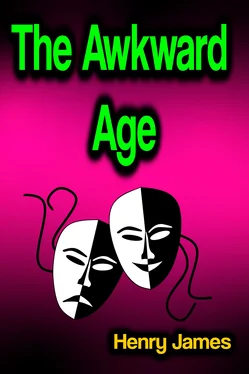"In the country?"
"She stays with her to-night in Hill Street. They go down together to-morrow. Why hasn't Aggie been?" Mrs. Brookenham went on.
The Duchess handsomely stared. "Been where?"
"Why here, to see Nanda."
"Here?" the Duchess echoed, fairly looking again about the room. "When is Nanda ever here?"
"Ah you know I've given her a room of her own—the sweetest little room in the world." Mrs. Brookenham never looked so comparatively hopeful as when obliged to explain. "She has everything there a girl can want."
"My dear woman," asked the Duchess, "has she sometimes her own mother?"
The men had now come in to place the tea-table, and it was the movements of the red-haired footman that Mrs. Brookenham followed. "You had better ask my child herself."
The Duchess was frank and jovial. "I would, I promise you, if I could get at her! But isn't that woman always with her?"
Mrs. Brookenham smoothed the little embroidered tea-cloth. "Do you call Tishy Grendon a woman?"
Again the Duchess had one of her pauses, which were indeed so frequent in her talks with this intimate that an auditor could sometimes wonder what particular form of relief they represented. They might have been a habit proceeding from the fear of undue impatience. If the Duchess had been as impatient with Mrs. Brookenham as she would possibly have seemed without them her frequent visits in the face of irritation would have had to be accounted for. "What do YOU call her?" she demanded.
"Why Nanda's best friend—if not her only one. That's the place I SHOULD have liked for Aggie," Mrs. Brookenham ever so graciously smiled.
The Duchess hereupon, going beyond her, gave way to free mirth. "My dear thing, you're delightful. Aggie OR Tishy is a sweet thought. Since you're so good as to ask why Aggie has fallen off you'll excuse my telling you that you've just named the reason. You've known ever since we came to England what I feel about the proper persons—and the most improper—for her to meet. The Tishy Grendons are not a bit the proper."
Mrs. Brookenham continued to assist a little in the preparations for tea. "Why not say at once, Jane"—and her tone, in its appeal, was almost infantine—"that you've come at last to placing even poor Nanda, for Aggie's wonderful purpose, in the same impossible class?"
The Duchess took her time, but at last she accepted her duty. "Well, if you will have it. You know my ideas. If it isn't my notion of the way to bring up a girl to give her up, in extreme youth, to an intimacy with a young married woman who's both unhappy and silly, whose conversation has absolutely no limits, who says everything that comes into her head and talks to the poor child about God only knows what—if I should never dream of such an arrangement for my niece I can almost as little face the prospect of throwing her MUCH, don't you see? with any young person exposed to such an association. It would be in the natural order certainly"—in spite of which natural order the Duchess made the point with but moderate emphasis—"that, since dear Edward is my cousin, Aggie should see at least as much of Nanda as of any other girl of their age. But what will you have? I must recognise the predicament I'm placed in by the more and more extraordinary development of English manners. Many things have altered, goodness knows, since I was Aggie's age, but nothing's so different as what you all do with your girls. It's all a muddle, a compromise, a monstrosity, like everything else you produce; there's nothing in it that goes on all-fours. I see but one consistent way, which is our fine old foreign way and which makes—in the upper classes, mind you, for it's with them only I'm concerned—des femmes bien gracieuses. I allude to the immemorial custom of my husband's race, which was good enough for his mother and his mother's mother, for Aggie's own, for his other sisters, for toutes ces dames. It would have been good enough for my child, as I call her—my dear husband called her HIS—if, not losing her parents, she had remained in her own country. She would have been brought up there under an anxious eye—that's the great point; privately, carefully, tenderly, and with what she was NOT to learn—till the proper time—looked after quite as much as the rest. I can only go on with her in that spirit and make of her, under Providence, what I consider any young person of her condition, of her name, of her particular traditions, should be. Voila, ma chere. Should you put it to me whether I think you're surrounding Nanda with any such security as that—well, I shouldn't be able to help it if I offended you by an honest answer. What it comes to, simply stated, is that really she must choose between Aggie and Tishy. I'm afraid I should shock you were I to tell you what I should think of myself for packing MY child, all alone, off for a week with Mrs. Grendon."
Mrs. Brookenham, who had many talents, had none perhaps that she oftener found useful than that of listening with the appearance of being fairly hypnotised. It was the way she listened to her housekeeper at their regular morning conference, and if the rejoinder ensuing upon it frequently appeared to have nothing to do with her manner this was a puzzle for her interlocutor alone. "Oh of course I know your theory, dear Jane, and I dare say it's very charming and old-fashioned and, if you like, aristocratic, in a frowsy foolish old way—though even upon that, at the same time, there would be something too to be said. But I can only congratulate you on finding it more workable than there can be any question of MY finding it. If you're all armed for the sacrifices you speak of I simply am not. I don't think I'm quite a monster, but I don't pretend to be a saint. I'm an English wife and an English mother— I live in the mixed English world. My daughter, at any rate, is just my daughter, I thank my stars, and one of a good English bunch: she's not the unique niece of my dead Italian husband, nor doubtless either, in spite of her excellent birth, of a lineage, like Aggie's, so very tremendous. I've my life to lead and she's a part of it. Sugar?" she wound up on a still softer note as she handed the cup of tea.
"Never! Well, with ME" said the Duchess with spirit, "she would be all."
"'All' is soon said! Life is composed of many things," Mrs. Brookenham gently rang out—"of such mingled intertwisted strands!" Then still with the silver bell, "Don't you really think Tishy nice?" she asked.
"I think little girls should live with little girls and young femmes du monde so immensely initiated should—well," said the Duchess with a toss of her head, "let them alone. What do they want of them 'at all at all'?"
"Well, my dear, if Tishy strikes you as 'initiated' all one can ask is 'Initiated into what?' I should as soon think of applying such a term to a little shivering shorn lamb. Is it your theory," Mrs. Brookenham pursued, "that our unfortunate unmarried daughters are to have no intelligent friends?"
"Unfortunate indeed," cried the Duchess, "precisely BECAUSE they're unmarried, and unmarried, if you don't mind my saying so, a good deal because they're unmarriageable. Men, after all, the nice ones—by which I mean the possible ones—are not on the lookout for little brides whose usual associates are so up to snuff. It's not their idea that the girls they marry shall already have been pitchforked—by talk and contacts and visits and newspapers and by the way the poor creatures rush about and all the extraordinary things they do—quite into EVERYTHING. A girl's most intelligent friend is her mother—or the relative acting as such. Perhaps you consider that Tishy takes your place!"
Mrs. Brookenham waited so long to say what she considered that before she next spoke the question appeared to have dropped. Then she only replied as if suddenly remembering her manners: "Won't you eat something?" She indicated a particular plate. "One of the nice little round ones?" The Duchess appropriated a nice little round one and her hostess presently went on: "There's one thing I mustn't forget—don't let us eat them ALL. I believe they're what Lord Petherton really comes for."
Читать дальше












